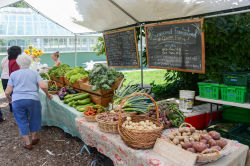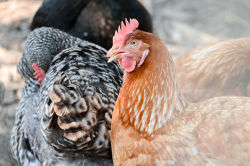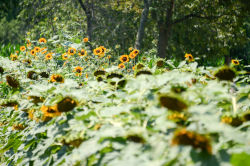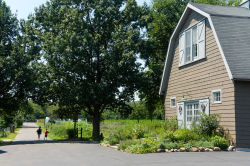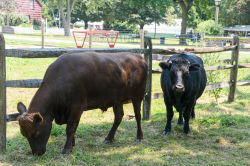Queens Farm Park
Creedmoor Farm Park
Creedmoor Farm Park is named after the old Creed family farmhouse, thought to date back to the 1730s. Since the American Revolutionary War (1775-1783) the site was the preserve of the Creed farm, but has since served functions as diverse as the site of several National Rifle Association title matches and the home of Creedmoor State Hospital.
Until 1871 Creedmoor Farm Park and the surrounding area were the property of the Creed family. The Creed farmhouse originated as a small frame home, which combined traditional Dutch colonial architecture such as a curved eave and a wide overhang on the roof, with English elements, including a chimney in the center of the house. In August 1871 Conrad Poppenhusen (1818-1883), the promoter behind the Central Railroad of Long Island, bought a right-of-way for the railroad all along the north side of Braddock Avenue, including the Creed Family farm. Poppenhusen offered the remainder of the farm to the National Rifle Association as a rifle range for the New York State National Guard. When the NRA agreed, they renamed the site Creedmoor, after the Creed family. From the 1870s to the 1890s, Creedmoor hosted the National Rifle Association’s title match. Many nearby streets hold names relating to the association, including Winchester Boulevard as well as Range, Musket, Pistol, and Sabre Streets. In the 1890s, the property was acquired by the State. The range was closed in 1907. In 1912, the land was developed as a “farm colony” for many of the Brooklyn Psychiatric Center’s patients. A successful venture, the facilities were expanded and eventually became a separate entity from the Brooklyn center. By 1934 the hospital had grown to include 70 buildings, and was known as Creedmoor State Hospital.
This property passed to the City from the State on June 26, 1981. In 1987 the park was named by Parks Commissioner Stern. In the park stands the Jacob Adriance Farmhouse, which provides educational tours and information sessions on horticultural technology, farm life history and food preparation. The site also houses a fully operational farm, which grows basic crops such as corn, tomatoes, cucumbers, and zucchini and is home to cows, goats, sheep, ducks and pigs. In 1997 a $1,023,000 renovation of the farm’s greenhouse was funded by Borough President Claire Shulman. Additionally the park contains two soccer fields operated by the Littleneck/Douglaston Youth Club.
Check out your park's Vital Signs
Clean & Safe
Green & Resilient
Empowered & Engaged Users
Share your feedback or learn more about how this park is part of a
Vital Park System



